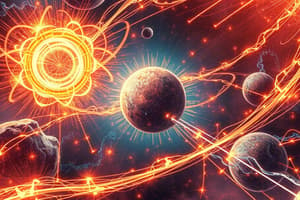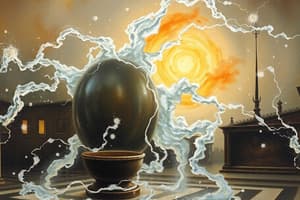Podcast
Questions and Answers
What is the definition of force?
What is the definition of force?
- An interaction that changes the motion of an object (correct)
- The energy stored within an object
- The capacity to do work
- A state of rest or uniform motion
What does Newton's Second Law of Motion state?
What does Newton's Second Law of Motion state?
- An object in motion stays in motion
- For every action, there is an equal and opposite reaction
- Force equals mass times acceleration (F = ma) (correct)
- Energy cannot be created or destroyed
Which of the following is a type of energy?
Which of the following is a type of energy?
- Static Energy
- Kinetic Energy (correct)
- Magnetic Energy
- Momentum Energy
What does the Conservation of Momentum state?
What does the Conservation of Momentum state?
What is a characteristic of mechanical waves?
What is a characteristic of mechanical waves?
According to the first law of thermodynamics, what happens to the energy in a closed system?
According to the first law of thermodynamics, what happens to the energy in a closed system?
Which principle states that it is impossible to know both the position and momentum of a particle exactly at the same time?
Which principle states that it is impossible to know both the position and momentum of a particle exactly at the same time?
What occurs in electromagnetic induction?
What occurs in electromagnetic induction?
Flashcards are hidden until you start studying
Study Notes
Overview of Physics
- Definition: The study of matter, energy, and the fundamental forces of nature.
- Branches:
- Classical Mechanics: Motion and forces.
- Electromagnetism: Electric and magnetic fields.
- Thermodynamics: Heat and energy transfer.
- Quantum Mechanics: Behavior of particles at atomic and subatomic levels.
- Relativity: Gravity and the structure of spacetime.
Key Concepts
-
Force:
- Definition: An interaction that changes the motion of an object.
- Types:
- Gravitational
- Electromagnetic
- Strong Nuclear
- Weak Nuclear
-
Newton’s Laws of Motion:
- First Law: An object in motion stays in motion unless acted upon by an external force.
- Second Law: Force equals mass times acceleration (F = ma).
- Third Law: For every action, there is an equal and opposite reaction.
-
Energy:
- Definition: The capacity to do work.
- Types:
- Kinetic Energy (energy of motion)
- Potential Energy (stored energy)
- Conservation of Energy: Energy cannot be created or destroyed, only transformed.
-
Momentum:
- Definition: The product of mass and velocity (p = mv).
- Conservation of Momentum: In a closed system, total momentum remains constant.
-
Waves:
- Definition: Disturbances that transfer energy through space or matter.
- Types:
- Mechanical Waves (require a medium, e.g., sound)
- Electromagnetic Waves (do not require a medium, e.g., light)
- Properties: Wavelength, frequency, amplitude.
-
Thermodynamics:
- Laws of Thermodynamics:
- First Law: Energy is conserved; heat added to a system equals work done plus change in internal energy.
- Second Law: Entropy of an isolated system always increases.
- Third Law: As temperature approaches absolute zero, the entropy of a perfect crystal approaches zero.
- Laws of Thermodynamics:
-
Electricity and Magnetism:
- Electric Fields: Areas around charged particles where other charges would experience force.
- Magnetic Fields: Areas around magnets where magnetic forces are exerted.
- Electromagnetic Induction: Generation of electric current by changing magnetic fields.
-
Quantum Mechanics:
- Particle-wave duality: Particles exhibit both particle-like and wave-like behavior.
- Uncertainty Principle: It is impossible to know both the position and momentum of a particle exactly at the same time.
-
Relativity:
- Special Relativity: Proposes that the laws of physics are the same for all non-accelerating observers; light's speed is constant.
- General Relativity: Theory of gravitation; describes gravity as a curvature of spacetime caused by mass.
Important Formulas
- Kinetic Energy: KE = 1/2 mv²
- Potential Energy: PE = mgh
- Force: F = ma
- Momentum: p = mv
- Wave Speed: v = fλ (where f = frequency and λ = wavelength)
Applications
- Engineering: Principles of mechanics and thermodynamics are applied in construction and manufacturing.
- Technology: Understanding electromagnetism is essential for electronics and communications.
- Astronomy: The laws of physics govern the movement and behavior of celestial bodies.
Overview of Physics
- Physics is the study of matter, energy, and the fundamental forces of nature.
- Major branches of physics include classical mechanics, electromagnetism, thermodynamics, quantum mechanics, and relativity.
Key Concepts
- Force is an interaction that changes the motion of an object.
- Types of force include gravitational, electromagnetic, strong nuclear, and weak nuclear.
- Newton's Laws of Motion describe the fundamental principles of motion:
- First Law: An object at rest stays at rest, and an object in motion stays in motion at a constant speed and direction unless acted upon by a net external force.
- Second Law: Force is equal to mass times acceleration (F = ma).
- Third Law: For every action, there is an equal and opposite reaction.
- Energy is the capacity to do work.
- The two main types of energy are kinetic energy (energy of motion) and potential energy (stored energy).
- The Law of Conservation of Energy states that energy cannot be created or destroyed, only transformed from one form to another.
- Momentum is the product of mass and velocity (p = mv).
- The Law of Conservation of Momentum states that in a closed system, the total momentum remains constant.
- Waves are disturbances that transfer energy through space or matter.
- Two main types of waves are mechanical waves (require a medium, e.g., sound) and electromagnetic waves (do not require a medium, e.g., light).
- Key wave properties include wavelength, frequency, and amplitude.
- Thermodynamics is the study of heat and its relation to other forms of energy.
- The Laws of Thermodynamics describe the behavior of energy:
- First Law: Energy is conserved. Heat added to a system equals the work done plus the change in internal energy.
- Second Law: The entropy of an isolated system always increases.
- Third Law: As temperature approaches absolute zero, the entropy of a perfect crystal approaches zero.
- The Laws of Thermodynamics describe the behavior of energy:
- Electricity and Magnetism are intertwined phenomena.
- Electric fields are areas surrounding charged particles where other charges experience force.
- Magnetic fields are areas around magnets where magnetic forces are exerted.
- Electromagnetic induction is the generation of electric current by changing magnetic fields.
- Quantum mechanics studies the behavior of particles at atomic and subatomic levels.
- Particle-wave duality suggests that particles exhibit both particle-like and wave-like behavior.
- Heisenberg's Uncertainty Principle states that it is impossible to know both the position and momentum of a particle exactly and simultaneously.
- Relativity describes gravity and the structure of spacetime.
- Special Relativity proposes that the laws of physics are the same for all non-accelerating observers, and the speed of light is always constant.
- General Relativity describes gravity as a curvature of spacetime, caused by mass and energy.
Important Formulas
- Kinetic energy: KE = 1/2 mv²
- Potential energy: PE = mgh
- Force: F = ma
- Momentum: p = mv
- Wave speed: v = fλ (where f = frequency and λ = wavelength)
Applications of Physics
- Engineering: Principles of mechanics and thermodynamics are essential for construction and manufacturing.
- Technology: Understanding electromagnetism is critical for electronics and communications.
- Astronomy: The laws of physics govern the movement and behavior of celestial bodies.
Studying That Suits You
Use AI to generate personalized quizzes and flashcards to suit your learning preferences.




